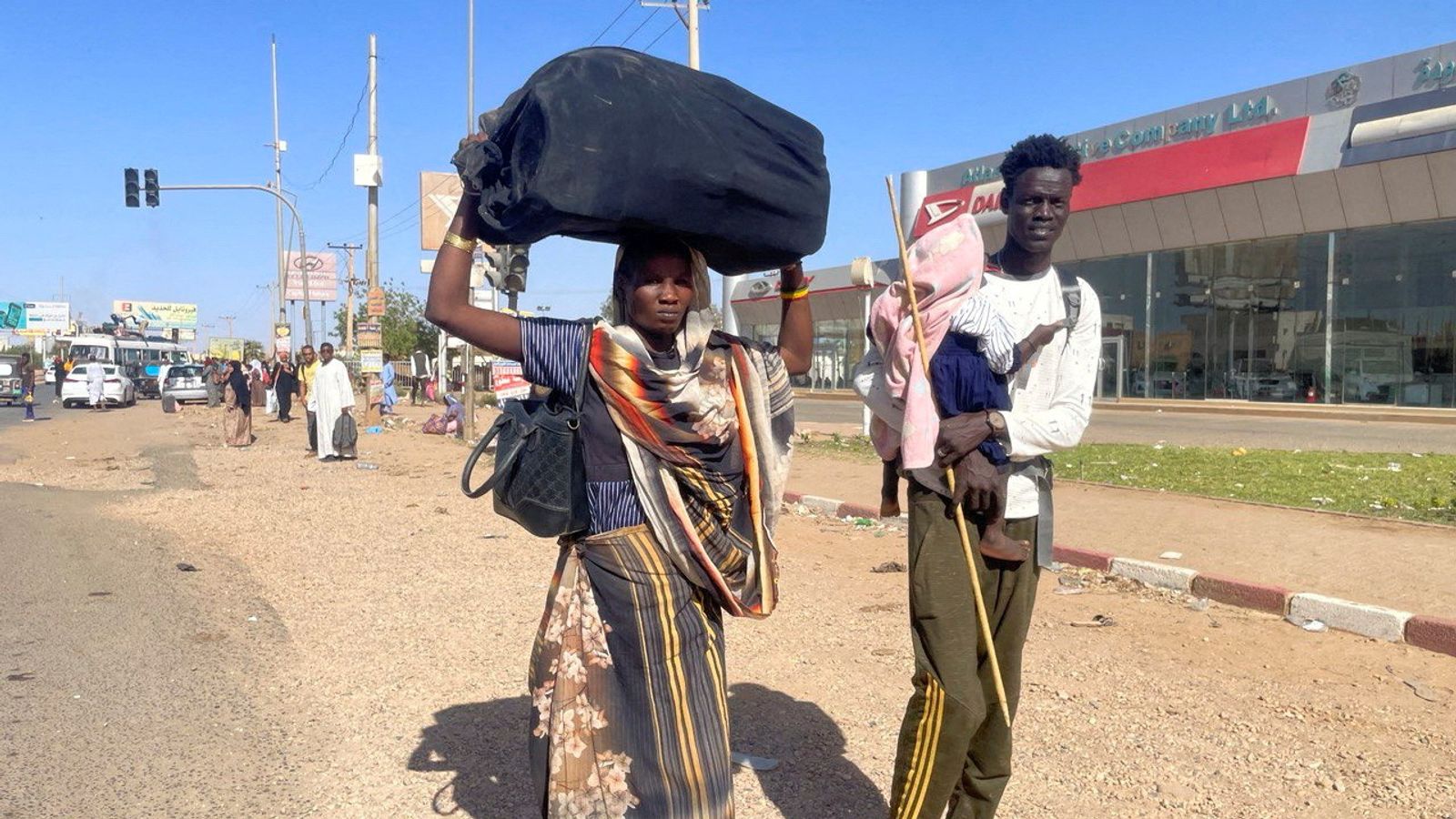Sudanese paramilitary group agrees to 72-hour ceasefire – as US confirms one of its citizens has died

The paramilitary group fighting the army in Sudan has agreed to a “complete ceasefire” for 72 hours – as the US confirmed one of its citizens has died in the six-day conflict.
The Rapid Support Forces (RSF) said it agreed to the truce on humanitarian grounds as Muslims celebrate Eid Al-Fitr – which marks the end of the month-long dawn-to-sunset fasting of Ramadan.
The paramilitary group said the pause in fighting, which has left more than 330 people dead and at least 3,300 wounded, will allow for the opening of humanitarian corridors to “evacuate citizens and give them the opportunity to greet their families”.
The ceasefire began at 6am local time (5am UK time) but the Sudanese military is yet to comment
UN Secretary-General Antonio Guterres had earlier appealed for both sides to commit to a three-day ceasefire to coincide with Eid al-Fitr.
US preparing to evacuate citizens
Meanwhile, a US State Department spokesperson has confirmed an American citizen has died in the country.
The department said in a statement: “We can confirm the death of one US citizen in Sudan. We are in touch with the family and offer our deepest condolences to them on their loss.
“Out of respect for the family during this difficult time, we have nothing further to add.”
Advertisement
The US and other countries have been making preparations to evacuate their citizens in Sudan – a difficult prospect since most major airports have become battlegrounds and movement out of the capital Khartoum to safer areas is dangerous.
The US military has been moving assets to a base in the Horn of Africa nation of Djibouti for a possible evacuation of American Embassy personnel, administration officials said.
Japan plans to send military planes to Djibouti, and the Netherlands has dispatched its own to Jordan.
UK Foreign Secretary James Cleverly will cut his Pacific tour short and return from New Zealand on Friday to focus on Britain’s response to the Sudan crisis..
Meanwhile, Sudan’s army ruled out negotiations with the RSF on Thursday saying it would only accept its surrender.
This was a change of stance from days earlier when Abdel Fattah al Burhan, the head of Sudan’s army, told Sky News he was open to negotiations.
Please use Chrome browser for a more accessible video player
1:36
Smoke rises above Sudan capital
Why has violence broken out?
The clashes began on Saturday 15 April when tensions over the transition from military to civilian rule in the country erupted into violence.
The RSF has said it had to act in “self-defence” to repel what it described as a coup attempt in the country.
The paramilitary group and the Sudanese army had been allies after coming together to oust former leader Omar al Bashir in 2019.
However, there have since been long-running disagreements between the two sides over how the country should be run.
Since the clashes broke out both sides have claimed to be in control of strategic locations, including the presidential palace, airports and air bases.
The fiercest battles between the army and the RSF have been in and around Khartoum – one of Africa’s largest urban areas – and in Darfur, still scarred by a long conflict that ended three years ago.
Please use Chrome browser for a more accessible video player
1:16
Missiles and violence in Sudan
Truce follows failed ceasefire
The 72-hour truce comes after a tenuous 24-hour ceasefire that began on Wednesday was broken by fighting throughout the day.
The demise of the truce, which was the second attempt this week, underscored the failure of the United States, UN, European Union and regional powers to push Sudan’s top generals to halt their campaigns to seize control of the country.
Instead, army chief General Burhan and RSF commander General Mohammed Hamdan Dagalo have appeared determined to win outright military victory over the other.
Click to subscribe to the Sky News Daily wherever you get your podcasts
Gunfire could be heard constantly across the Khartoum throughout the day on Thursday.
Residents reported the heaviest fighting around the main military headquarters in the centre of the city.
Military warplanes struck RSF positions at the airport and in the neighbouring city of Omdurman, residents said.
The military said its warplanes also struck a convoy of RSF vehicles heading to the capital, though the claim could not be independently confirmed.
Khartoum residents have been desperate for a respite after days of being trapped in their homes, with food and water running out.
Meanwhile, alarm has grown that the country’s medical system was on the verge of collapse, with many hospitals forced to shut down and others running out of supplies.